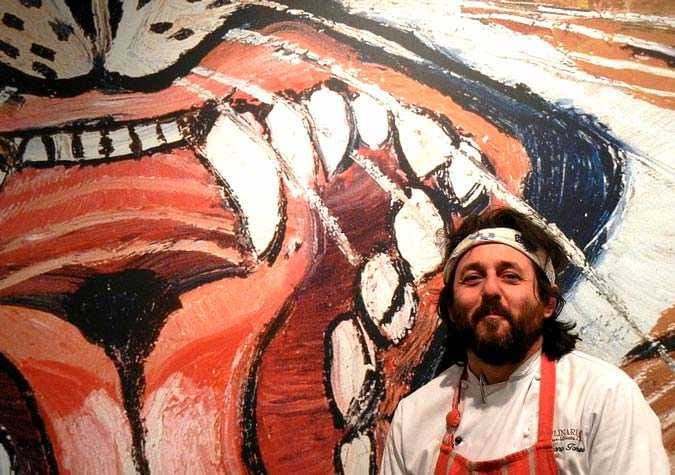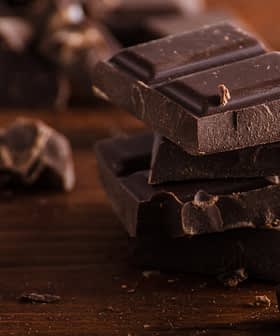
There are restaurants located within great museums throughout the world, but probably only a handful where you might enter a room to admire the artworks, and end up gazing instead at the plates being served.
This is what happens at L’Imbuto (The Funnel), chef Cristiano Tomei’s restaurant that recently moved from Viareggio, a pretty seaside town on the Tuscan coast, to the ancient walled town of Lucca.
The new restaurant location is inside the Lu.C.C.A. — Lucca Center of Contemporary Art, a privately-owned museum dedicated to contemporary and video artworks.
Chef Cristiano Tomei proposes a “surprise menu” where guests need only choose how much they want to eat and pay, from 20 to 90 euros. He has been called “the primitive chef” for his visceral and unsophisticated, yet not at all unrefined cuisine.
Tomei, 39, and full of natural energy wears a bandanna to keep his long hair in place. There are no electrical gadgets in his kitchen, everything is handmade. He will change the dishes every night, according to what the market offers, his mood or the ongoing exhibition, or even table by table.
Trusting him is a good choice, and satisfaction is guaranteed. “For me, cuisine should be pure delight, and easily understandable to everyone,” he said. “I had my ultra-creative phase too, but now I think that cooking should be the result of a different research, made day after day among the fields and the market stalls.”
So every morning, Cristiano walks along the pine grove along the Viareggio seashore where he still lives, searching for pine cones and barks or waiting for the fishermen’s boats to be back with the catch of the day.
He also personally chooses the extra virgin olive oils, of course, which play an important role in his cuisine. He mostly uses local ones from the Lucca region, which are versatile and well balanced thanks to the land’s strategic position between sea and mountains.
He uses extra virgin in every dish, from starters to desserts, fine-tuning its intensity.
For example, it will be a delicate and soft oil in the lavish olive oil mayonnaise with the raw fish stuffed sandwich, filled with lemon zest, tomatoes and fried artichokes: a mouthwatering bite served in a cheeky fast food style packaging. The same delicate oil is also used in the excellent Russian salad and prawns crème brulée, where it does not overpower the fish taste.
Yet, the oil will be intense and pungent in the “fake risotto,” finely-chopped vegetables creamed with olive oil ice cream, served with raw Norway lobsters (which are actually very common in Italy) and Tuscan kale powder instead of salt.
The same “explosive smoothness” is found in the oil- and Parmesan-stuffed ravioli with grilled cuttlefish: as one bites into the stuffed pasta, the filling, made of an unstable emulsion, melts in the mouth, creating the feeling of a typical Italian comfort food that Tomei refers to as a “mom’s embrace.”
Extra virgin olive oil also is one of the main ingredients of the chef’s signature dish: strips of beef served on pine bark. The bark is oven-warmed to enhance the aroma of both the wood and the oil, which the chef uses to rub the raw meat thoroughly. The raw texture of the meat is enhanced by adding the meat fat, cubed, pan roasted and almost melted, and crunchy hand made crisps.
Diners are asked to sniff it and eat it with their fingers, following the primordial and carnivorous instinct (assuming that they eat meat, of course) to recreate, on the palate as well in the mind, the taste of a juicy, rare-cooked steak.
Extra virgin olive oil is present in the desserts, too: the olive oil and orange cream with hazelnuts couscous is only lightly sweet, and it is accompanied by a small apple cake slice. This seemingly normal pie conceals a surprising heart of sweet, soft onions hidden by the fruit. A great way to end the meal, hanging between sweet and savoury, appearance and reality.
When we visited L’Imbuto, the Museum was hosting an exhibition dedicated to the Italian tormented artist Antonio Ligabue (until the 9th of June 2013) whose title is “Instinct, genius and madness.” It appeared to be a perfect title for Tomei’s cuisine as well.
via della Fratta,36
Phone +39 0583 491280
tasting menu 20, 40, 60, 90 euros
www.limbuto.it








